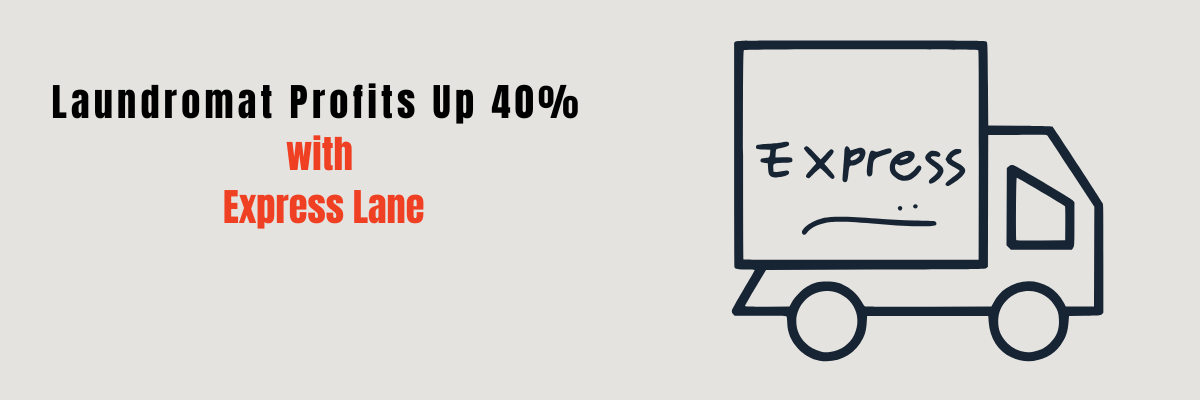30 Pros and Cons of Owning a Laundromat: The Spin Cycle of Entrepreneurship & Laundromat Software Benefits


Embarking on the journey of owning a laundromat can be an exciting and potentially lucrative venture for new entrepreneurs. In a world where cleanliness and convenience are paramount, the demand for clean clothes remains constant. However, like any business endeavor, owning a laundromat comes with its own set of advantages and challenges. In this comprehensive guide, we will explore the 30 key pros and cons that every aspiring laundromat owner should carefully consider. Whether you're enticed by the promise of recurring revenue, the appeal of a semi-passive business model, or the opportunity to create a community hub, understanding the intricacies of laundromat ownership is crucial. Join us as we unravel the fabric of this industry, examining the various threads that intertwine to form a rich tapestry of entrepreneurship.
The Pros of Owning a Laundromat:
1. Steady Income from Owning a Laundromat:
One of the most appealing aspects of owning a laundromat is the assurance of a consistent demand for laundry services. Regardless of economic conditions, people will always need clean clothes. This fundamental necessity ensures a steady flow of customers, providing a reliable income source for laundromat owners.
2. Recurring Revenue Streams:
Laundromat ownership offers a business model built on recurring revenue streams. Customers return regularly for their laundry needs, creating a stable and predictable income. This ongoing patronage establishes a loyal customer base, further solidifying the financial sustainability of the business.
3. Low Labor Costs in Laundromat Ownership:
Unlike many businesses that require a significant workforce, laundromats operate efficiently with minimal staffing requirements, especially when equipped with modern, automated machines. This translates to reduced labor costs, making it an attractive option for entrepreneurs looking to maximize profits while minimizing personnel expenses.
4. Flexible Hours for Laundromat Owners:
As the owner of a laundromat, you have the flexibility to set operational hours that align with your personal preferences and lifestyle. Whether you prefer to run a 24/7 establishment or operate during specific hours, you have the autonomy to tailor the schedule to your convenience.
5. Multiple Income Streams:
Beyond the core laundry services, owning a laundromat provides opportunities to diversify income. Introducing vending machines stocked with snacks or beverages, selling laundry supplies like detergent and dryer sheets, or offering premium services like professional folding can enhance profitability. These supplementary income streams contribute to a well-rounded revenue profile.
6. Semi-Passive Business Nature:
Laundromats are often considered an attractive investment option for individuals seeking passive income once they are established and efficiently managed. While initial setup and occasional maintenance demand attention, daily operations can be relatively hands-off. This aspect is particularly attractive to entrepreneurs seeking a business with the potential for financial stability while allowing them to pursue other interests or ventures.
7. Laundromats as Community Hubs:
Owning a laundromat extends beyond providing laundry services; it offers a unique opportunity to create a community hub. Laundromats often serve as gathering places where people from diverse backgrounds connect. Customers spend time together, fostering a sense of belonging and community, which can enhance the reputation and customer loyalty to your business.
8. Scalability of Laundromat Ownership:
As you delve deeper into owning a laundromat, expansion opportunities abound. Whether it's adding more machines to your existing location or opening new outlets in different areas, the scalability of laundromat ownership allows you to grow your business and increase your revenue potential.
9. Resilience in the Laundromat Business:
Economic downturns often leave many businesses struggling, but owning a laundromat offers a degree of resilience. Laundry is a perpetual necessity, and people continue to require clean clothes regardless of economic fluctuations. This resilience can help your business weather challenging economic times more effectively.
10. Potential for Absentee Ownership:
With effective systems and management in place, owning a laundromat doesn't always necessitate your physical presence. You can hire competent staff and implement efficient processes, enabling you to operate your laundromat remotely or semi-absentee. This flexibility can suit entrepreneurs with diverse commitments and interests.
11. Tax Benefits of Laundromat Ownership:
Owning a laundromat can introduce you to various tax advantages. You may be eligible for deductions on equipment purchases, maintenance expenses, and other operational costs. These tax benefits can significantly impact your bottom line and improve the overall profitability of your business.
12. A Straightforward Business Model:
The beauty of owning a laundromat lies in its straightforward core operations. Even individuals new to entrepreneurship can quickly grasp the fundamentals. With a focus on cleanliness, machine maintenance, and customer service, laundromat ownership offers a relatively uncomplicated business model.
13. Building a Loyal Customer Base:
A clean, well-maintained laundromat ensures customer loyalty. When people consistently find reliability in the services of the laundromat you own, they are more likely to become regular customers. Building a loyal customer base can lead to sustained revenue and positive word-of-mouth marketing.
14. Adaptable Locations for Laundromats:
Whether you prefer bustling urban centers or quieter suburban locales, owning a laundromat offers flexibility in choosing operational spots. You can tailor your laundromat location to match your target demographic and business strategy, increasing the chances of success.
15. Promoting Eco-Friendly Practices:
Modern laundromat ownership allows you to champion environmental causes. By integrating energy-efficient machines, using sustainable laundry practices, and promoting eco-friendly detergents, you can attract environmentally conscious customers. This not only aligns with responsible business practices but also enhances your laundromat's appeal in the community.
The Cons of Owning a Laundromat:
1. Significant Upfront Investment:
One of the primary hurdles in the laundromat business is the substantial initial investment required. This encompasses purchasing or leasing a suitable location, acquiring commercial-grade laundry machines, and potentially renovating the space to meet safety and accessibility standards. These costs can quickly add up, making entry into the industry financially demanding.
2. Ongoing Equipment Maintenance:
Maintaining commercial laundry equipment is crucial to ensure smooth operations. These machines undergo significant wear and tear due to constant use. Routine maintenance is essential, and when breakdowns occur, repair costs can be hefty. Ensuring that your equipment is always in top condition is a recurring expense that owners must budget for.
3. Competition Concerns:
The level of competition in the laundromat industry can vary greatly depending on your location. In densely populated areas, you might face competition not only from other laundromats but also from individuals who own home laundry machines. Navigating this competitive landscape requires strategic planning and potentially offering unique services or amenities to attract customers.
4. Staffing Challenges:
While laundromats generally require minimal staffing compared to many other businesses, finding reliable employees can still be a challenge. It's essential to have dependable attendants who can handle customer inquiries, maintain cleanliness, and ensure the machines are functioning correctly. The hiring and management of staff come with their own set of responsibilities.
5. Utility Costs:
Running a laundromat involves significant utility expenses. Laundry machines consume substantial amounts of water, electricity, and gas. Maintaining a comfortable and well-lit environment for customers also contributes to high utility bills. Careful monitoring and energy-efficient practices can help mitigate these costs, but they remain a significant ongoing expense.
6. Seasonal Fluctuations:
Laundromat businesses can experience seasonal variations in customer demand. For instance, during the summer, people may do more laundry due to outdoor activities, while the winter months might see reduced usage. These fluctuations can impact your revenue, so it's essential to budget for leaner times and potentially offer promotions to attract customers during slower periods.
7. Security Concerns:
Laundromats can sometimes be targets for vandalism, theft, or other security issues. Handling cash transactions and operating late hours can make these businesses vulnerable. Owners must invest in security measures such as surveillance systems, alarm systems, and good lighting to deter potential incidents and protect both customers and assets.
8. Changing Technology:
Staying up-to-date with the ever-evolving laundry technology landscape is not just an option but a necessity. Modern machines equipped with advanced features are more efficient and can attract customers. However, adopting these technologies can be expensive and time-consuming. Upgrading machines, implementing cashless payment systems, and integrating automation can require a substantial financial investment and the effort to learn and manage these new systems.
9. Navigating Regulations:
Operating a laundromat entails dealing with a web of local regulations and permits. These requirements can be intricate and time-consuming to navigate. You may need licenses for water usage, sanitation, and business operation, among others. Complying with these regulations is essential, but it can be a bureaucratic challenge.
10. Cash Handling:
Handling cash transactions, which is common in laundromats, comes with its set of challenges. There's a risk of errors in accounting, theft, or even counterfeit bills. It necessitates robust cash management protocols, including secure safes and diligent record-keeping, to safeguard your revenue.
11. Customer Behavior:
Laundromat owners occasionally face challenges related to customer behavior. Customer dissatisfaction, whether due to machine malfunctions or cleanliness issues, can lead to disputes and negative reviews. Misuse of equipment, such as overloading machines, can accelerate wear and tear, requiring more frequent maintenance. Managing these aspects of customer behavior is vital to maintain a positive reputation.
12. Location Dependency:
The success of your laundromat business is intrinsically tied to its location. A poor choice in location can significantly impact foot traffic and revenue potential. Factors such as proximity to residential areas, competitors, and accessibility for your target demographic should be carefully considered during the initial planning stages.
13. Limited Growth Potential:
In some areas, there may be a saturation point for laundromats. If your chosen location is already densely populated with similar businesses, it can be challenging to find room for growth. Expanding to new locations may be the only option for scaling your business, but this comes with its own set of challenges and costs.
14. Marketing and Promotion:
Building a strong and loyal customer base is an ongoing effort that requires consistent laundromat marketing and promotion. Even in areas with a steady demand for laundry services, you'll need to actively attract and retain customers. This may involve running promotions, maintaining a clean and inviting atmosphere, and responding to customer feedback.
15. Time Investment:
While laundromats are often considered semi-passive businesses, they still demand your time and attention. Regular checks on equipment, addressing maintenance issues promptly, and overseeing staff require your involvement. Additionally, monitoring financial records, handling customer concerns, and managing marketing efforts all contribute to the time investment required for success.
Before embarking on the journey of owning a laundromat, it's essential to thoroughly research the industry, carefully assess potential locations, and create a comprehensive business plan. Being aware of these pros and cons and having a clear strategy to address them will help you navigate the challenges and maximize the opportunities in the laundromat business. It's crucial to grasp both the benefits and risks associated with laundromat ownership.
Navigating Challenges: How Innovative Turns Laundromat Software Eases the Burdens of Ownership
1. Equipment Maintenance and Management:
Laundromat software can track the maintenance schedules of your machines, sending timely alerts for servicing. This helps prevent costly breakdowns and ensures your laundry equipment operates at peak efficiency.
2. Staffing Efficiency:
With features for employee scheduling and performance tracking, software streamlines staffing processes, reducing the time and effort required for managing personnel.
3. Utilities Monitoring:
Many software solutions offer energy monitoring and usage analysis, enabling owners to identify inefficiencies and take steps to optimize utility costs.
4. Seasonal Fluctuations:
By providing detailed analytics on customer footfall and peak usage times, software helps owners anticipate and plan for seasonal fluctuations in business.
5. Security Enhancement:
Laundromat software often includes security features such as remote surveillance and automated alerts, enhancing the safety of both premises and customers.
6. Regulatory Compliance:
Software can assist in managing permits, licenses, and compliance requirements by providing reminders and organizing documentation.
7. Customer Experience:
From online booking and payment options to loyalty programs and personalized promotions, software enhances the customer experience and fosters loyalty.
8. Financial Management:
Advanced accounting and reporting modules simplify financial tracking, making it easier to monitor expenses, revenues, and profitability.
9. Marketing and Promotion:
Laundromat software can facilitate targeted marketing campaigns through email or SMS, allowing owners to effectively promote their services.
10. Time Management:
By automating routine tasks and providing real-time insights, software frees up time for owners to focus on strategic planning and growth.
In essence, laundromat software serves as a dynamic partner that empowers owners to proactively tackle challenges while maximizing the benefits of their investment. From optimizing operations to enhancing customer satisfaction, these digital solutions play a pivotal role in transforming the cons of laundromat ownership into opportunities for success."
In the intricate world of laundromat ownership, where opportunities and challenges interweave, innovative technology emerges as a guiding thread that can lead owners towards a tapestry of success. As we conclude this exploration of the 30 pros and cons that shape the laundromat landscape, it's evident that the potential for profitability and growth is undeniable. However, the journey is not without its hurdles. Enter laundromat software, a beacon of advancement that casts light on the path forward.
By embracing cutting-edge software solutions, laundromat owners can turn the tables on challenges, transforming them into stepping stones towards prosperity. From equipment maintenance to staffing efficiency, and from utilities monitoring to regulatory compliance, these digital tools offer a comprehensive toolkit to navigate the complexities of ownership with confidence.
As the spin cycle of innovation continues, the role of laundromats in communities remains steadfast, ensuring clean clothes and convenience for generations. Armed with knowledge, technology, and a passion for service, aspiring laundromat owners can unravel the fabric of obstacles, weaving a vibrant tapestry of entrepreneurship that stands the test of time.
So, to those on the verge of embarking on this exhilarating journey, remember this: In the world of laundromat ownership, challenges are merely opportunities in disguise, waiting to be illuminated by the brilliance of modern technology. As the wheel of progress turns, may your laundromat journey be marked by steady growth, thriving communities, and the seamless rhythm of success. With innovation as your ally, you're poised to spin your way to a prosperous future in the world of laundromat entrepreneurship.
FAQs: Pros and Cons of Owning a Laundromat & Laundromat Software Benefits
Question: What are the primary pros of owning a laundromat?
Answer: Owning a laundromat can offer a steady stream of income, relatively passive operation, low labor requirements, and a recession-proof business model.
Question: What are the cons associated with owning a laundromat?
Answer: The downsides can include high initial investment costs, machinery maintenance, potential vandalism or theft, and dependence on the local market for consistent foot traffic.
Question: Is owning a laundromat profitable?
Answer: Yes, laundromats can be highly profitable, especially in densely populated areas or where access to in-home laundry facilities is limited. However, profitability depends on factors like location, management, and competition.
Question: How does laundromat software enhance the operation of my business?
Answer: Laundromat software can automate tasks like payment processing, track sales and expenses, offer loyalty programs to customers, and manage machine maintenance schedules.
Question: Is the investment for a laundromat high?
Answer: The initial investment for owning a laundromat can be high, considering costs for machines, leasing or purchasing property, and getting the necessary permits. However, the ongoing operational costs are relatively low.
Question: Are laundromats recession-proof?
Answer: Historically, laundromats have been considered recession-proof because people always need clean clothes, regardless of the economy.
Question: What are the challenges in owning a laundromat?
Answer: Challenges can include machine breakdowns, fluctuations in utility prices, managing competition, and handling potential customer complaints.
Question: How do I choose a prime location for my laundromat?
Answer: Consider areas with high foot traffic, limited access to in-home laundry, and locations near apartment complexes or college campuses.
Question: How does laundromat software help in customer retention?
Answer: Many laundromat software solutions offer loyalty programs, promotional offers, and reminders, which can help in retaining customers and encouraging repeat business.
Question: Can owning a laundromat be a passive business?
Answer: While not entirely passive, owning a laundromat can be less hands-on than other businesses, especially when using software for operations and hiring staff to manage day-to-day tasks.
Question: Is machinery maintenance a significant con in the laundromat business?
Answer: Yes, regular maintenance is crucial to ensure machines run efficiently, which can be a recurring expense and require time.
Question: How can I protect my laundromat from vandalism or theft?
Answer: Investing in security measures like surveillance cameras, alarm systems, and secure payment methods can help protect your business.
Question: Do laundromat software solutions offer remote monitoring capabilities?
Answer: Yes, many modern laundromat software solutions offer remote monitoring, allowing owners to oversee operations from anywhere.
Question: What are the benefits of offering self-service in my laundromat?
Answer: Self-service reduces labor costs, offers flexibility to customers, and can be more efficient when combined with intuitive laundromat software.
Question: Is competition a significant challenge when owning a laundromat?
Answer: Depending on the location, competition can be a challenge. Researching the local market and offering unique services or promotions can help you stand out.
Hopefully, these FAQs shed light on the complexities and rewards of owning a laundromat. The blend of traditional business challenges with modern solutions like laundromat software offers a unique spin on entrepreneurship.






